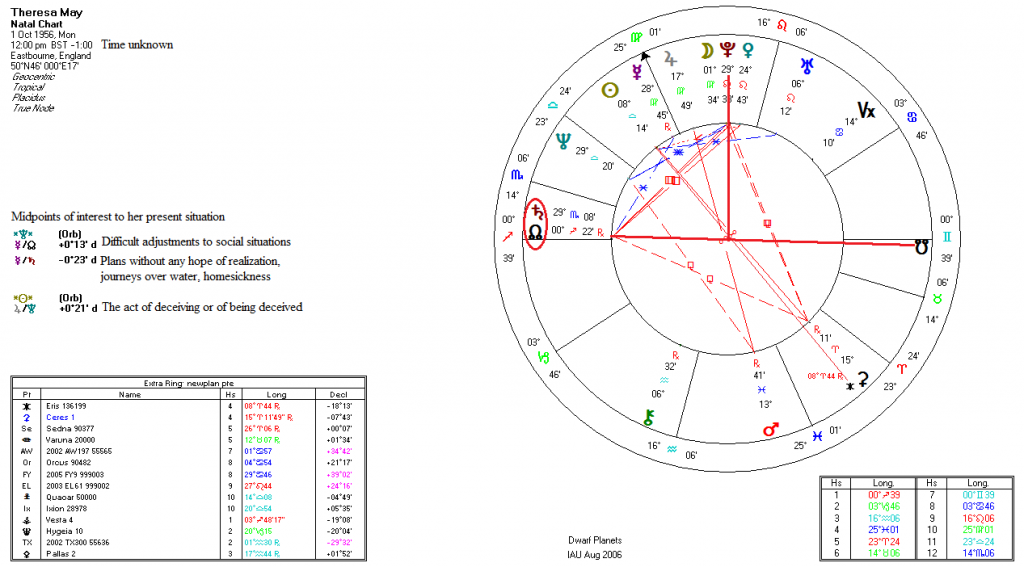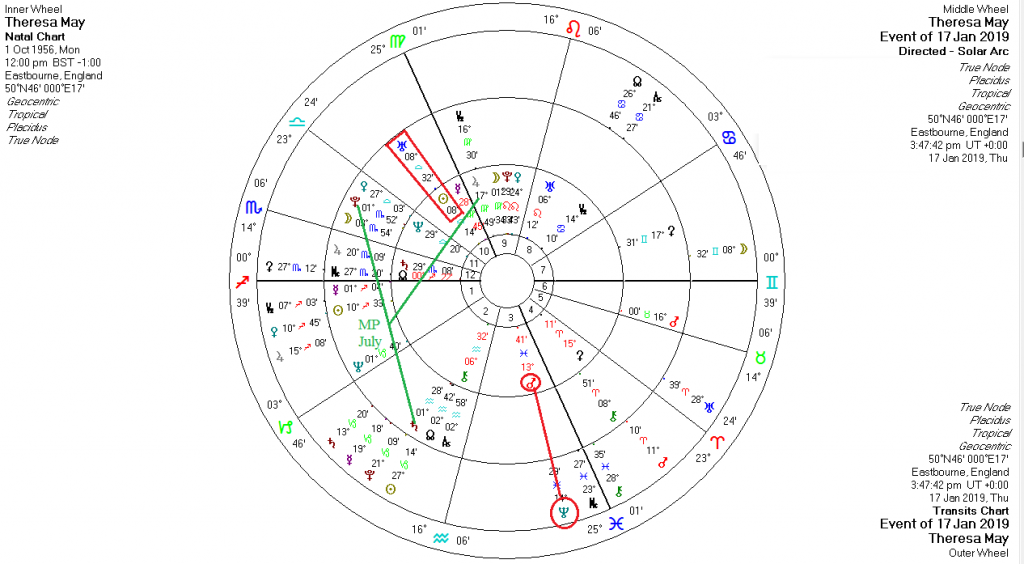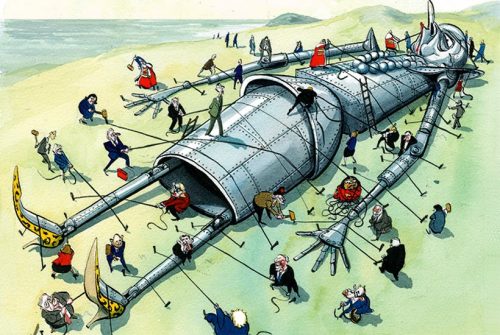As we know by now, Theresa May has survived the no-confidence vote against her. It was not by a large margin, though, which would be troubling for her. The final vote count was 306 to 325. In fact, it was a win only by a slim margin. This is less than 25% of the margin by which she won her last confidence vote back in December. Clearly, confidence in the government is slipping fast. After the vote she was still vowing to carry through with Brexit, to find some sort of compromise that would be suitable to the House, but held mum about taking the no-deal Brexit off the table when pressed on the matter by Jeremy Corbyn. To her mind, nothing has changed. One gets the sense, though, that something is in the works.
The vote took place a few minutes after 7:00 PM last night, so the chart shown for the vote in the previous post is valid, with maybe a change in one degree for the Ascendant. We won’t go over it here. Instead we’ll have a look at Theresa May’s astrology to see what might be going on in her head and then move on to what it will likely mean for the UK. Her chart is below (bigger):

Theresa May was born on 1 Oct 56 in Eastbourne, England, time unknown. The chart above shows a Virgo Moon, but her devotion to her ideals and to the Conservative Party would tend to favor a Moon in Leo. Regardless of the time of day, her Moon is conjunct Pluto, and if born not too far before noon, would also square Saturn. In trying to figure out why she so stubbornly holds the line and keeps repeating the same things over and over, people question whether she is vain, obsessed or stubborn. The astrological answer to that is, d) none of the above. What we see instead is the manifestation of several factors, starting with her Saturn/Pluto square, with Saturn conjunct the north node. That places Pluto at the bending of her nodes. It is a combination that speaks of many things, but one of the more telling is a sort of grim determination. That is different from stubbornness. The configuration just mentioned points to a person who is not afraid of hard work, but at the same time gives a fanatical adherence to one’s ideals once they are decided upon. It also produces inhibitions when coming into contact with people, hard struggles for success, elusive success and shared suffering in adverse circumstances.
The significant midpoints in her chart, of which the aforementioned configuration is one, reinforce what has just been stated, with the added note of the possibility of deception or of being deceived. I would suspect the latter in her case, although the look in her eye when Corbyn challenged her about the no-deal Brexit was telling. On the whole, though, this is a chart that lends to what is otherwise known as a Libran characteristic – the ‘iron fist in the velvet glove’. She has decided, and that is that, at least as far as she is concerned. Especially if she has Leo Moon, it will be difficult to move her, if that is even possible.
But May is not a woman with great founts of energy. He retrograde Mars in Pisces betrays it. Her insistence on standing firm, her constant talk of ‘strong and stable government’ is a projection, a cover for a perceived, and real, lack of energetic reserves. There is also quite a strong sense of loyalty, too, as indicated by the Saturn/Venus square, but which also adds a note of coldness to the emotional nature. It is a placement that will push a person to stick to another person or a cause long after it is useful or advisable to do so. It can be an admirable quality, but it can also be quite self-destructive. Letting go is difficult. This, along with the Saturn/Pluto, can tend toward a sense of martyrdom.
There is a great drive for success with May, though, if the Moon is Square Saturn/conjunct Pluto, but with the Mars in Pisces retro great care should be taken on her part not to let herself get run down by pushing ahead against the wind. And, with the Libran Sun she does not like adversity, although she can do so, but it wears on her nerves.
As to her transits and so forth, (below, bigger) she currently has a solar arc of Uranus to her Sun, which is a real push to do something original and independent, which is what she is seeking to do with her Brexit deal, and why she is standing firm with her convictions. On the other hand, she has had transiting Neptune on her Mars off and on for the past year, which has not helped her energy levels in the least, and which would drive a lesser person to the bottle or the pharmacy, all the above being taken together as background. If she is not careful she could be headed for an illness around midyear, when the directed Saturn/Pluto forms a midpoint with her natal Jupiter. So, this is what we have with Theresa May in her present state. That could change, and the stress on her at the moment is very great. But with the Mars in Pisces her outlook tends to go down when she is tired, and this situation has to be wearing on her.

As for the UK and where it stands now, the main calls are for a People’s Vote – a second referendum, now that the deal has fallen through. Having watched elections and referendums for some years now (I won’t say how many), this is not a good idea. There is too much that can go wrong. I have heard it said, too, that if a politician wants a certain policy to go through and there is a resistant Parliament, then the best thing to do is to hold a referendum. The public can be far easier to manipulate than we might think. People vote with their gut, not with their head, as a general rule. There is still a great amount of animosity in Britain toward the EU. And although it is true that people in the UK know more now than they did, unless there is something compelling to counter the politics of the lowest common denominator, as the Leave campaign engaged, then the result could very likely turn out the same. So with that in mind, there are further things to consider in the lead-up to Monday, when May is set to come back with ‘Plan B’.
Former international trade negotiator for the UK, Jason J. Hunter, gave an interview after the no-confidence vote regarding the current state of Brexit. Here is a summary of his points, all valid:
- Revoke Art 50. It cannot be extended because there are EU parliamentary elections in May and as it stands the UK cannot put forward any candidates due to Brexit.
- There is no time to organize a people’s vote before the March 29th
- There will be no further negotiations with the EU. The deal that was voted on the 15th was the deal. There will be no others.
- A deal is impossible, as the vote on the 15th A no-deal Brexit would be too catastrophic. (although there is ongoing argument about that, largely with conservatives saying that it is all scaremongering, that the UK will be ‘just fine’ out of the EU. See penultimate bullet point below as to why it would not be ‘fine’.)
- The ongoing argument is that Brexit is “the will of the people”, in spite of the fact that 17.4 million people who voted Leave did not vote for a half-in, half-out Brexit deal. They voted to leave, whereas 16.8 million people voted to stay. The Leave camp is split. So leaving either without a deal or with is not the ‘will of the people’.
- The ‘Vote Leave’ campaign lied to people in order to get them to vote Leave. Aside from being immoral, it is also illegal, because the factions of the Vote Leave campaign have all been prosecuted for fraud in the referendum.
- There was massive foreign influence in the Leave campaign. (And it wasn’t from the Russian government. Factions in the US played a big hand.)
- Claims that the EU has bullied the UK about the Brexit deal are bollocks, because the UK helped write the rules of EU membership. UK negotiators knew the rules before negotiations even started. The EU simply stuck to the rules. Basically, the UK has ‘faffed around’ for 2 ½ years over issues that should have done in the first few months after the referendum while ignoring the more important task of forging a future relationship with the EU.
- There is not a single trade deal that has been made between the UK and countries which have trade deals with the EU. Those nations are not inclined to roll over the current deals they have with the UK, which are in line with EU guidelines.
- Half of the countries in the UK (Northern Ireland and Scotland) voted to remain in the EU. In the EU a consensus is needed for anything of that magnitude to get done. There is no consensus in the UK. Thus, there is no mandate for Brexit.
Yes, the interview he gave is on that ‘Russian network’. Is that really important? (not) Where else is common sense to find a voice? It certainly does not appear to be coming from the British mainstream press, who completely avoid the topic of Article 50. To add to the points above, in a recent CEE Union debate the topic was about trade wars, a bit off topic it would seem, with the protagonist arguing that they would ruin the EU economic growth rate. There is truth to that, but to oppose the motion, Bill Blain of Shard Capital had this to say in relation to Brexit after hearing about the no-confidence vote last night:
…the UK’s decision to exit Europe has triggered an absolute breakdown of parliamentary party discipline and leaves the UK caught in an unresolvable voting vacuum. It’s a classic example of populism – MPs saving their own political skins over the priorities of the country. As I’ve said before – the optimal electoral position for a UK politician looking to keep their job is to support remain: on the basis 48% of the electorate will support you while the 52% Brexiteers are hopelessly split between deal and no deal!
This is added to previous remarks about the vote count for the Brexit referendum. In other words, the biggest problem for the EU in Blain’s mind is the problem of demographics, and there is also truth to that. And that was one of the main barking points in the Leave campaign’s dog whistle politics in the 2016 referendum. He went on to say that there is no real sense of unified purpose between EU member states, with some former USSR states becoming satellite states of German manufacturing, thus tied to the German economy, with problems both social and economic increasing the further east one goes in Europe. This harks back to a remark I made in the Capricorn letter in the section on the Eurozone, in that EU expansion eastward was premature and not well thought out. The tendency is for workers in Eastern European countries to migrate westward where infrastructure, pay and benefits are better, like to the UK for instance. However, contrary to how it was portrayed by the Leave campaign, the migrant workers from Eastern Europe have had a big positive effect on the UK, according to Blain, as they quickly fit in and adapt, contributing to the society and economics of the UK. Therein lies a good case for keeping the open borders of the Lisbon Treaty, albeit that treaty has other problems that need to be addressed, as we saw with the migrant crisis of the mid-teens of this century.
So, as a result of conservative backbenchers’ efforts to get the UK out of the EU, along with foreign actors, the UK now finds itself in a right royal pickle. Its politicians apparently are all seeking to save their political hides, save for a few who have their constituents’ best interests in mind. The solar arc of Pluto to the UK ascendant is doing a fine job of bringing the undercurrents of UK politics up to the surface.
Repeating, the current talk in the UK now is for a ‘People’s Vote’. But as stated above, that is not possible without at least extending Article 50. This would appear to be a political maneuver to cause a crash out without a deal, seeing as it cannot be organized in time, nor is there currently any talk among parliamentarians or media about Article 50. The talk of another vote is placating to some people in the UK, largely Remainers, but the sense is there is something else behind it. There is also a hidden danger in another vote, in that all of the old political tricks would be out in force again to leave, it would further set the voting factions against each other and most of all, would not really solve anything, unless the UK voted to remain in the EU. Even then, would anything really be solved? The nation would still be divided. Some people rightly have serious doubts about another vote. What is showing is a concerted effort to avoid the topic of Article 50 altogether and to sweep it under the rug. That in itself should make one suspicious. Why? Why the rush to the March deadline, the delaying tactics, the distractions of the parliamentary debates and so forth?
The Labour leader Jeremy Corbyn has in mind to leave the EU, whereas the largest part of the Labour parliamentarians would vote to remain. If this is the case, why is he still Labour leader if he does not represent the will of his voting base? The Labour Party has been branded with the ‘disaster socialist’, Leninist hat, which wants the UK to crash out, cause a huge crisis, with the ensuing crisis (hopefully) bringing the masses of voters back into the Labour fold. That is the thinking anyway. But, this would appear to be an attempt to smear Labour, with fears from conservatives that Labour would take power anyway if a general election were to be held. They are probably justified in their fears. So, why wish to crash out and cause chaos? I don’t have enough information to say.
But it is telling that Corbyn, knowing what Brexit will do to his voter base, still advocates for the UK to crash out without a deal, which is increasingly looking to be the case now. He had hung hopes on a no-confidence motion causing the downfall of May. But that is a non-issue now. We’ll see what develops in the coming days, but unless Labour returns to its voter base it, too, is facing political fallout and possible disaster in coming elections. It puts one in mind of the Democrats in the US, who are seriously out of touch with their own voters, which caused the election of Donald Trump. That bears some reflection, not just for the US, but for the UK as well.
As for the Conservatives, they are split on the notion of a deal or no deal exit. The one constant is that they want to leave, eventually, somehow. But there is something else on the horizon, of which there is virtually no discussion, and that is the brewing crisis within the EU itself. So here is a final point, and for anyone who looks at the larger picture, it should be carefully considered in light of Brexit:
There is growing serious talk now of the EU possibly breaking up, which would render all the Brexit song and dance moot. With no EU, there would have been no point to the vote. However, there is a larger consideration. A split EU is a weak Europe, including the UK, at the mercy of larger powers, possibly with the exception of Germany. A split EU, though, would present a huge headache for Germany, too. But France and the UK are facing major problems with their electorates, and those have little to do with the EU. A united EU is a powerful bloc, that can overcome much should it stay united. And to put a finer point on it, the UK is a microcosm of the EU, with the UK itself facing serious divisions within. There is no doubt that the EU must reform if it is to survive. It faces serious challenges in the next few years, especially related to its banking system, austerity measures and globalist pressures, along with its demographics. It must become less focused on France and Germany and more egalitarian. If the UK stays in the Union, then there is a powerful impetus to bring about the needed changes to EU governance and finance, which could actually give the UK what it wants and also benefit all of Europe. Probably wishful thinking, but the thought is out there.
But when it comes down to the brass tacks of Brexit, what we see in the UK in Parliament, in Theresa May and in Labour is not some overriding concern with the British people, but rather plays to domestic politics. Theresa May has been heard to say, “Politics is not a game.” If not, it would certainly appear to be so in the UK. As Jason Hunter (previously cited) stated in that same interview, watching UK politics now is an embarrassment to the nation. The whole drama has been badly executed and handled from the start. But there is a ray of hope. There will be no ‘Plan B’ deal, but May is supposed to present something by Monday at the latest. Monday, as it turns out, is the day of the full moon and total lunar eclipse. And that eclipse falls on the UK’s Jupiter, which should help to give a greater sense of unity and optimism. More on Tuesday. Stay tuned…
Featured pic from The Spectator

